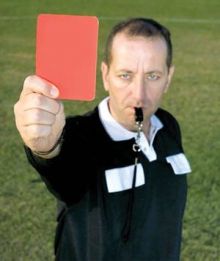The news about the resignation of the coach of the Ukrainian soccer team Myron Markevych literally had the effect of a bomb. Of course, it is true that many people predicted similar developments in the light of the conflict that broke out, but nobody wanted to take it seriously. Yet, it happened: Markevych, having worked as the chief coach of the team for four months, has resigned. The country’s fans have since felt and experienced conflicting feelings, but shock was their first reaction.
For reference, let us recall that the roots of the conflict go back to the events which happened two years ago. However, the conflict exploded only on August 16 this year, when the administration of the soccer club Metalist officially received the extract from the minutes of the control and disciplinary committee (CDC) of the Soccer Federation of Ukraine, according to which Metalist and Karpaty were each deprived of nine points they earned this season and punished by a number of additional sanctions. The control and disciplinary committee of the Soccer Federation of Ukraine found out that the match on April 19, 2008 in Kharkiv Metalist vs. Karpaty (4:0) was held in violation of the Fair Play principles. Then the president of the soccer club Metalist Oleksandr Yaroslavsky accused the authorities of the Soccer Federation of Ukraine of being involved in this decision, and the conflict moved to the level of Yaroslavsky vs. Surkis.
It never pays to delve deeply into the essence of the conflict. In any case, there will be those who support and those who do not support the decision of Markevych. That is their right. Markevych has the right to choose whether to work or not to work under current conditions. And it’s a fact that working under such conditions for a professional is unpleasant, to put it mildly. It is no secret: business, politics, and soccer are tightly intertwined in our country. In a very politicized soccer it is difficult to please everyone. And those who manage to do it have to sacrifice something; very often it’s the professionalism. No one doubts the fact that Markevych is a professional. He found the courage to turn in his resignation now, not a couple of months before the Euro championship, thus giving the future coach a chance to prepare the team. He considered the situation unacceptable, and he left.
However, the point lies in another issue. The situation prevailing in Ukrainian soccer reflects the situation in the Ukrainian society. A person with a professional vision took the post, but he is hindered in his work by “big bosses” who decide everything, because personal interest is dominant. They do not care that they reach success at the cost of the common cause. Their conflict, that is what counts! And you, please, either accept our rules, or stay in your comfortable corner. Isn’t it the same in politics? Or maybe in the “transparent” Ukrainian business the situation is different? The fact is that these same people have ruled in soccer, business, and politics for a dozen years.
Undoubtedly, Markevych became a hostage of the available confrontation. But to a large extent the entire Ukrainian society is a hostage. Both because less and less time remains until the Euro-2012, and because one just wants to live differently.







